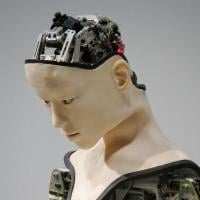The AI Testing Singularity

Artificial intelligence is the next exponential technology trend, and it’s knocking on our front door.
AI is broken into two major categories of study. Artificial general intelligence is the effort to make machines that are conscious like humans and can reflect on their own existence. The other branch is narrow AI, also known as machine learning, which is focused on computer algorithms that can be trained with data to mimic human thinking—without actually thinking.
Machine learning is rapidly growing more powerful, already sometimes imitating the actions and judgments of humans better than humans in many fields. In the near future, even before machines are conscious, they will be able to mimic human testers. What will be the impact of AI on testing?
The AI testing singularity is the moment software can test itself without human intervention. This moment will come, and we all have questions before that happens: How will machines learn to test better than humans? Which testing activities will succumb to AI first? Which will be last?
There are those who say AI is just slightly smarter software and will be unable to ever behave like a human tester. Some say AI can never replace humans in testing because machines cannot think, and they would require human judgment and cognition to operate properly. Let’s politely say it is far easier to be a skeptic than to actually dive into the technology and understand its implications.
The reality, though, is that there are several factors that point to the AI testing singularity:
- The tech itself. Unlike previous technological revolutions (desktop, web, cloud, mobile), AI is designed to learn from humans and replicate their judgment and actions. AI is focused on solving human input and output functions, and testing is just one of them.
- The world is spending billions of dollars on AI research. The number of papers published on the topic is growing exponentially. For a long time our field was dependent on the R&D budget of open source “charity” projects such as Selenium and Appium and low-priority testing efforts of tooling companies and vendors. As we build AI-based testing approaches, we will ride an unfathomable wave of new R&D.
- AI by definition abstracts concepts and feeds on large amounts of data and/ computing. AI is itself just data and computing, so AI can learn from the very data it generates in a reinforcing feedback loop, and executing this loop can only takes minutes to improve itself. This means AI will get smarter far faster than humans can get smarter.
The AI testing singularity will not happen overnight. But it is inevitable; the question is just how soon, and how it will unfold. It’s important that you know how and when to bring AI into your own testing efforts, as well as where to invest in your personal learning to stay ahead of the technology curve.
Jason Arbon is presenting the keynote The AI Testing Singularity, as well as the tutorial Artificial Intelligence and Machine Learning Skills for the Testing World; the sessions Postmodern Testing and AI in Testing: A Moderated Panel Discussion; and the Leadership Summit session Lessons Learned Moving Up the Testing Leadership Ladder at the STAREAST 2019 conference, April 28–May 3 in Orlando, Florida.

